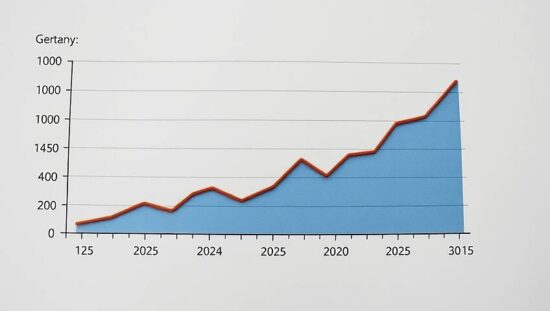Consumer prices in Germany have increased by an average of 2.2 percent in the year 2024 compared to the previous year, the Federal Statistical Office (Destatis) reported on Thursday. This inflation rate is significantly lower than in the three preceding years, with 5.9 percent in 2023, 6.9 percent in 2022, and 3.1 percent in 2021.
Prior to this, the 2 percent mark was rarely exceeded, with the last time being in 2011 at 2.2 percent. In December 2024, the inflation rate, measured as the change in the consumer price index (VPI) from the previous year, was 2.6 percent, thereby strengthening at the end of the year, after the monthly rates had increased steadily in the fourth quarter of 2024.
The core inflation rate, which excludes energy and food, was 3.0 percent in 2024, after 5.1 percent in 2023 and 3.8 percent in 2022. In comparison to the two preceding years, this value has weakened, but it is still significantly higher than the overall inflation rate. This key figure also highlights that the price increase in other good categories continued to be high in the average of 2024.
Prices for services overall rose by 3.8 percent in 2024 compared to the previous year, exceeding the average. Already in 2023, services had increased by 4.4 percent, and in the average of 2024, services such as insurance (+13.2 percent) became significantly more expensive. Social institution services (+7.8 percent), restaurant services (+6.8 percent), or vehicle maintenance and repair (+6.1 percent) also became noticeably more expensive in 2024 compared to 2023. Net rents for housing, which are significant for the price development, increased by 2.1 percent in the average of 2024 and were thus just below the overall inflation rate. Telephone services (0.0 percent) were also below the average of 2024, as a result of the price development from the previous year with the introduction of the Germany ticket in May 2023 (base effect).
In total, goods prices increased by 1.0 percent in the average of 2024 compared to 2023, which is significantly lower than the services. Among the goods, the prices for consumer goods increased by 0.9 percent, with price decreases in energy (-3.2 percent) and price increases in food (+1.4 percent) against each other. In the goods category of food, for example, edible fats and oils (+10.3 percent) or sugar, jam, honey, and other sweets (+6.4 percent) became noticeably more expensive for consumers in 2024 compared to 2023. On the other hand, dairy products (-2.1 percent) and vegetables (-1.5 percent) were cheaper, as was mentioned further. In addition, the prices for consumer goods increased in particular for non-alcoholic beverages (+6.4 percent) and tobacco products (+6.0 percent) in the average of 2024.
Energy products, on the other hand, became cheaper in 2024 compared to the previous year, with a decrease of 3.2 percent, after a 5.3 percent increase in 2023 and an enormous increase of 29.7 percent in 2022. In the average of 2024, the prices for household energy overall decreased by 3.1 percent. For example, electricity (-6.4 percent), light heating oil (-3.9 percent), and natural gas (-3.5 percent) were cheaper than a year earlier. However, district heating became significantly more expensive in the average of 2024 compared to 2023, rising by 27.1 percent. In addition, fuels (-3.2 percent) also became cheaper in the average of 2024 compared to 2023. Without considering energy prices, the core inflation rate in 2024 would have been 2.9 percent.
The inflation rate in Germany was 2.6 percent in December 2024 compared to December 2023, after 2.2 percent in November 2024, as the Federal Statistical Office reported. Thus, the price increase has strengthened again at the end of the year, after the monthly rates had increased steadily in the fourth quarter of 2024. The price increase for energy in December 2024 compared to December 2023 was minus 1.6 percent, after minus 3.7 percent in November 2024.
Within the year, mineral oil products became significantly cheaper in December 2024, with a decrease of 3.8 percent, of which light heating oil was 10.0 percent cheaper, and fuels were 3.3 percent cheaper. Electricity, on the other hand, was 2.9 percent cheaper in December 2024 compared to the previous year. Natural gas was 3.9 percent more expensive, and district heating even 30.7 percent more expensive in December 2024 compared to the previous year.
The price increase for food in December 2024 compared to the previous year was 2.0 percent. Without considering the prices for food and energy, the inflation rate in December 2024 would have been 3.3 percent, as the statisticians pointed out. This highlights that the price increase in other important good categories was over-average.
Prices for goods overall were 1.4 percent higher in December 2024 than in the previous year, as the official data shows. In addition to the price increase in consumer goods with 1.6 percent, including energy and food, the prices for durable goods also increased by 0.8 percent, with clothing items increasing by 2.8 percent, but computer equipment decreasing by 6.5 percent. The prices for services overall increased further, by 4.1 percent, with net rents for housing increasing by 2.1 percent. Some services, such as insurance (+16.6 percent), flight tickets (+9.3 percent), restaurant services (+6.6 percent), or vehicle maintenance and repair (+5.7 percent), became significantly more expensive in December 2024. On the other hand, only a few services were cheaper, such as telephone services (-1.0 percent).





